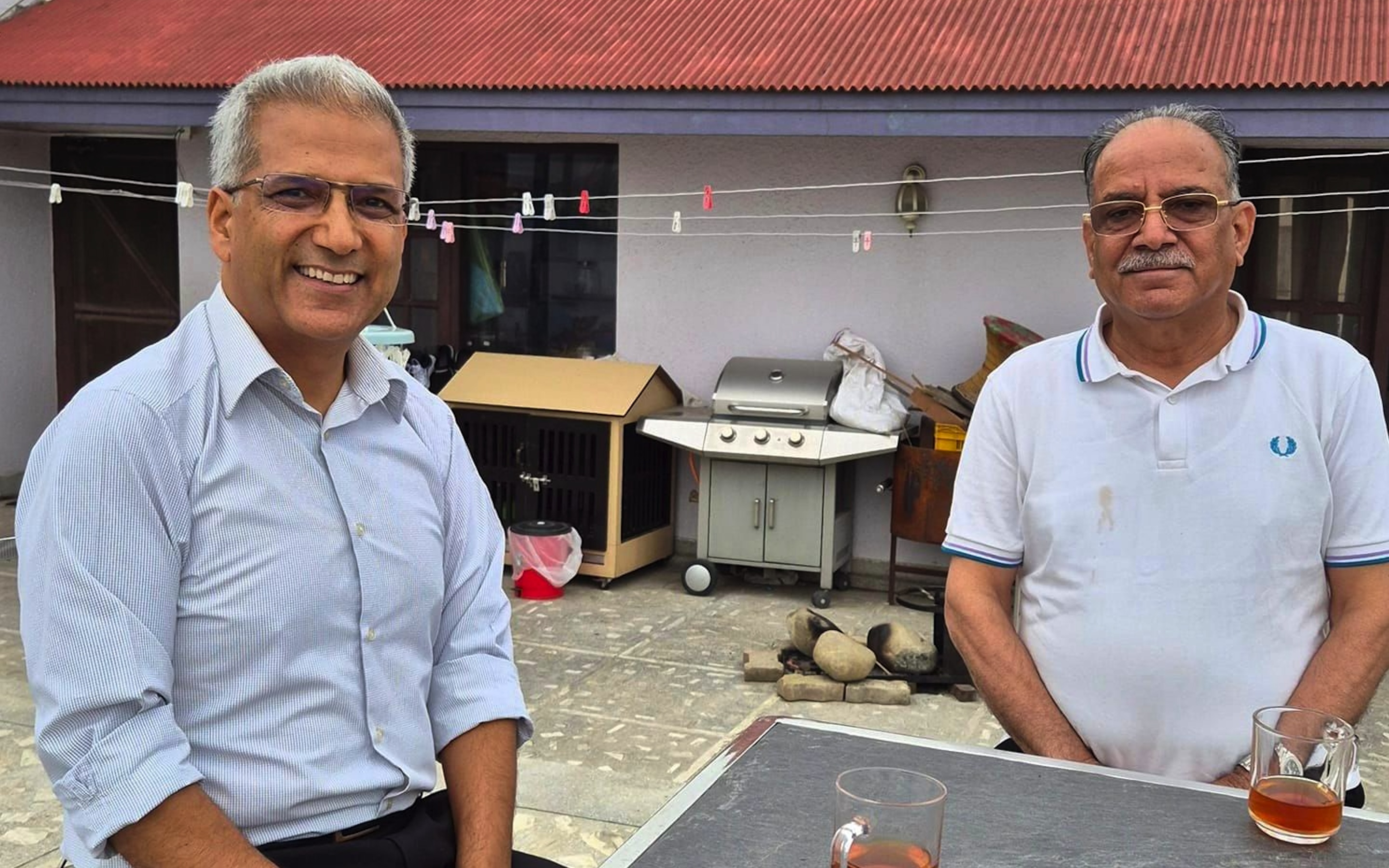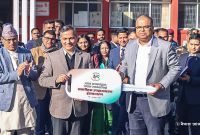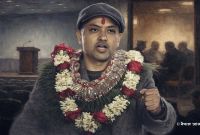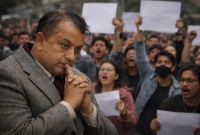Prachanda’s Surprising Praise for King Mahendra: Is the Republic Failing?
Rabindra Mishra and Prachanda's Recent Meeting Sparks Debate on Monarchy in Nepal

The recent meeting between Rabindra Mishra and Prachanda has ignited significant interest and debate in Nepal’s political circles. Prachanda, the leader of the Maoist movement who played a crucial role in establishing the republic, now seems to be reconsidering his stance on the current republican structure. Meanwhile, Mishra has been vocally advocating for the reinstatement of the monarchy. So, what does Prachanda’s concern about the current system signal? Does this conversation between these two leaders hint at a potential political shift in Nepal?
Mishra's Critical View
Rabindra Mishra has long been a critic of Prachanda’s leadership, holding him responsible for the deterioration of Nepal's political landscape. Mishra has accused Prachanda of pushing the country in the wrong direction under the guise of "progress." His recent social media post after meeting Prachanda reaffirms this criticism. Mishra revealed that they had an in-depth conversation at Prachanda's residence, stating, "The country has reached a point where, if the monarchy is not reinstated, it will head towards an 'explosive state.'"
Mishra’s statement doesn’t just demand political change; he firmly believes that without the monarchy, the country is on the verge of failure. His harsh critique of Prachanda's leadership and his promotion of the monarchy as a solution underline his deep dissatisfaction with the republican system. In Mishra’s eyes, the republic has failed to address Nepal's long-term interests, and the nation is now at a "tipping point."
Prachanda's Measured Response
While Prachanda did not fully agree with Mishra's views, he did acknowledge that the current system is faltering. In their conversation, Prachanda remarked that the country could not continue functioning as it is. He shared that he had been communicating this message during recent training sessions, indicating his own dissatisfaction with the current political state. This is one of the first instances where Prachanda has openly expressed doubts about the state of the republic and the need for reforms in the country’s political and economic systems.
During the discussion, Prachanda even praised the visionary leadership of King Mahendra, admiring certain aspects of the Panchayat era. He acknowledged that his review of Nepal’s industrial sector revealed that better governance was prevalent during that time. Such statements could pose a challenge not only to Prachanda but to the entire Maoist movement, which fought to dismantle the monarchy and establish a republic.
Is Monarchy Restoration the Center of Political Debate Again?
The discussion of reinstating the monarchy has resurfaced several times over the years in Nepal. Under Mishra’s leadership, the agenda has been pushed by the Rastriya Prajatantra Party and other pro-monarchist factions. However, Prachanda’s recent openness to reassessing the topic may further intensify this debate. In their meeting, Prachanda remarked, "If it benefits the country, I have always been open to working with the monarchy." This statement highlights a shift in Prachanda's thinking, signaling a possible reconsideration of his hardline republican stance.
Conversations like this between Mishra and Prachanda signal that Nepal’s political landscape could be heading toward a new chapter. With growing discontent over rising unemployment, corruption, and ineffective leadership, serious debates about reinstating the monarchy are likely to gain traction.
Prachanda’s Dilemma: Monarchy or Progress?
Prachanda’s remarks during the meeting show that he is not entirely satisfied with the current state of the republic. His comment to Mishra that "a break from the status quo is necessary" reveals his awareness of the system’s shortcomings. However, he also indicated that while he has not yet fully aligned with Mishra’s views, the monarchy is something he now contemplates before going to sleep at night, reflecting a mental dilemma.
That said, Prachanda has not agreed to all of Mishra’s ideas. He is not yet in a position to endorse the full reinstatement of the monarchy. However, his acknowledgment of the need to rethink Nepal’s political system shows that he is taking the idea seriously.
Conclusion
The recent meeting between Rabindra Mishra and Prachanda has revived the debate surrounding the reinstatement of the monarchy in Nepal. While Mishra firmly positions the monarchy as a solution for Nepal’s future, Prachanda has voiced his dissatisfaction with the current republican system, suggesting that change is necessary.
This meeting marks a significant event in Nepal’s political scene, where two leaders from opposing ideological backgrounds have engaged in serious discussions about the nation’s future. The long-term impact of this conversation remains to be seen, but it is clear that this dialogue between Mishra and Prachanda has sparked a new round of political debate in Nepal.
Rabindra Mishra's Social Media Post
Heart-to-Heart with Prachanda!
Yesterday, we met at an event. Today, after years, we met again at Prachanda’s residence.
"I told him that the country has reached a point where, if the monarchy is not reinstated, it will head towards an 'explosive state.' At that time, your so-called 'progress,' along with names and statues, will be wiped out." That was the crux of my long explanation.
Afterward, some of his remarks felt meaningful:
- "I have also concluded that the country can no longer continue in this manner. I’ve been saying the same thing during training sessions lately."
- "During my last term as Prime Minister, I reviewed the details of Nepal’s industries and realized that much better work was done during the Panchayat era. King Mahendra was truly a visionary king."
- "During the conflict, some of my colleagues were entirely negative about the monarchy. I, however, believed that if it benefited the country, it would be good to cooperate with the King."
- "If King Gyanendra had been a bit more flexible during the 2006-2007 movement, today’s situation would be entirely different."
- "It’s true that foreign intervention in the country has reached an extreme level."
- "Only now have I become the Prime Minister. During the war, there was no guarantee of survival. Everything we did was for the sake of building the country. Even today, my intention is to build the country, but it can’t be done this way anymore."
- "I’m not in a position to fully agree with your ideas just yet, but I can’t help but think about them before going to bed at night. A 'break in continuity' has become absolutely necessary."
After a long conversation on the terrace, we came down, where dozens of comrades from the Maoist party were waiting for Prachanda.
On the surface, they were waiting for their leader. But, in reality, they represented millions of Nepalis waiting for the day when this country will improve, and their children and parents will find happiness. They may be unaware that their lives have been, and will continue to be, spent waiting in vain.
As for me, I’m convinced that even if God Himself descended from heaven to fix this country, the current system won’t allow it, and things will only get worse.




![From Kathmandu to the World: How Excel Students Are Winning Big [Admission Open]](https://nepalaaja.com/img/70194/medium/excel-college-info-eng-nep-2342.jpg)
